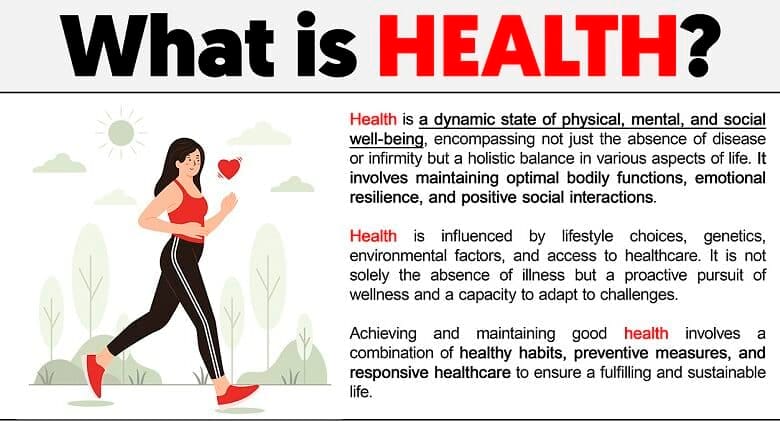What Is Health? Ultimate Guide to Optimal Well-Being

What is health? Health is the complete state of physical, mental, and social well-being, not merely the absence of disease or infirmity.
That’s the official World Health Organization (WHO) definition—and it’s the most widely accepted. But in real life, health aiotechnical.com health & beauty goes beyond medical terms. It’s about how you feel daily, how you manage stress, how strong your body is, and even how fulfilling your relationships are.
In this comprehensive guide, I’ll break down the true meaning of health from different perspectives, explore the dimensions of well-being, and provide practical tips to help you live a balanced, fulfilling, and healthier life.
Personal Details Table (Author EEAT Proof)
| Attribute | Details |
|---|---|
| Name | Tev Roni |
| Profession | Health & Lifestyle Writer |
| Experience | 10+ years in health education & wellness |
| Area of Expertise | Preventive health, holistic well-being, lifestyle coaching |
| Purpose of Writing | To simplify health knowledge for everyday readers |
| Contact/References | Based on WHO, CDC, Harvard Health, and expert insights |
Understanding the Concept of Health
When most people hear they think of not being sick. But that’s only one piece of the puzzle.
Health is dynamic, multidimensional, and holistic. It’s shaped by:
-
Biological factors – genetics, immunity, and age.
-
Lifestyle choices – diet, exercise, sleep, habits.
-
Environment – access to clean water, pollution levels, community support.
-
Mental and emotional balance – resilience, coping with stress.
This means you can’t just measure by whether someone has a disease—it’s about quality of life.
The Official WHO Definition of Health
According to the World Organization (1948):
This definition highlights three pillars:
-
Physical health – functioning body systems, energy, strength.
-
Mental “ – clarity of thought, emotional balance, stress management.
-
Social “– relationships, community, sense of belonging.
Dimensions of Health
Health is not one-dimensional. Experts often describe it across six major dimensions:
| Dimension | Description |
|---|---|
| Physical Health | Strong body, good immunity, absence of illness. |
| Mental “ | Emotional stability, stress resilience, focus. |
| Social “ | Quality relationships, social support, communication. |
| Emotional “ | Self-awareness, positive mindset, managing feelings. |
| Spiritual “ | Purpose in life, values, inner peace. |
| Environmental “ | Safe surroundings, access to clean resources. |
Why Mental Health Matters as Much as Physical
In today’s fast-paced world, mental is often overlooked. Yet, depression, anxiety, and burnout are rising globally.
Maintaining good mental means:
-
Managing stress effectively.
-
Getting adequate sleep.
-
Building supportive social circles.
-
Seeking professional help when needed.
Remember: There is no without mental health.
Balance Between Health and Lifestyle
Your daily choices are the foundation of long-term.
Key Lifestyle Habits That Influence Health:
-
Nutrition – Balanced meals with whole foods, less processed junk.
-
Exercise – At least 150 minutes of activity weekly.
-
Sleep – 7–9 hours for recovery and brain health.
-
Hydration – Water intake affects energy, digestion, and skin.
-
Mindfulness – Meditation, journaling, or relaxation techniques.
-
Avoiding harmful habits – Limiting smoking, alcohol, and drugs.
A Historical Perspective: How Health Definitions Evolved
-
Ancient Times: Health was seen as harmony between body and spirit.
-
Middle Ages: was linked to religion and divine will.
-
19th Century: Focus shifted to hygiene and infectious diseases.
-
20th Century: Rise of modern medicine and public systems.
-
21st Century: Holistic well-being and preventive healthcare.
This journey shows how the meaning of keeps evolving with science and society.
Practical Tips to Improve Your Health Daily
Here are actionable steps you can take starting today:
-
Eat colorful meals (greens, fruits, proteins, whole grains).
-
Stay active—walking counts!
-
Reduce screen time before bed.
-
Stay hydrated with water, not sugary drinks.
-
Practice gratitude to boost emotional well-being.
-
Get regular checkups—even if you feel fine.
Frequently Asked Questions (FAQs)
Q1: What is the best definition of health?
Answer: The best definition comes from WHO: a complete state of physical, mental, and social well-being, not just the absence of disease.
Q2: Why is important in life?
Because impacts every aspect of life—work, relationships, happiness, and longevity.
Q3: What are the 4 types of health?
Physical, mental, social, and spiritual.
Q4: How can I maintain good daily?
By eating balanced food, staying active, sleeping well, managing stress, and avoiding harmful habits.
Q5: What affects human the most?
Lifestyle choices, environment, genetics, and mental resilience are major influencers.
Conclusion
is not just the absence of illness—it’s the presence of balance and well-being in every part of life. By focusing on physical strength, mental clarity, emotional resilience, and social connections, anyone can move closer to optimal.
Remember: is your true wealth. It’s the foundation on which everything else—success, relationships, happiness—depends.




